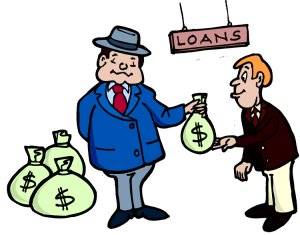A close friend recently shared his financial pains with me. He had two problems in particular. He was earning well, but still wasn’t able to save anything. His second problem was that he was frustrated because a large chunk of his salary was going into paying back loans.
Seems like your own situation?
 Don’t worry. It’s a common problem these days. People earn well, take loans, and end up paying a large part of their salaries as Easy Monthly Instalments (EMIs).
Don’t worry. It’s a common problem these days. People earn well, take loans, and end up paying a large part of their salaries as Easy Monthly Instalments (EMIs).
In my friend’s case, he was earning a handsome Rs. 80,000 a month. About 30 per cent, i.e., Rs. 24,000 went towards the EMI of his home loan. Another Rs. 12,000 (15 per cent) went towards the repayment of his car loan. He also had a credit card EMI of Rs. 10,000 (13 per cent) for a loan he took to fund a foreign trip with his family. With almost 58 per cent of his salary going towards loan repayments, his frustration was obvious.
I asked him if apart from his house (for which he took a loan), did he have other investments. He said that he had nothing significant, except for the Employee Provident Fund (EPF) with his company.
He also said that when he gets his next salary hike, he would prefer increasing his EMIs to pay-off the loan quickly, rather than investing or saving. This seemed like an alarming situation to me. However, he seemed determined to first clear off all his loans, and then start investing, even if it took him more than 10 years to do it.
Was his approach correct? Let’s try to answer that question objectively.
Nobody loves taking loans and paying interest. So, it’s very natural that one would want to pay it off as soon as possible and sleep peacefully.
But with only a limited working life available to all of us, it is also natural that we need to save for our future before it’s too late.
Please note that the house you plan to stay in, or are staying in, does not count as an investment as you neither generate any income from it, nor do you plan to sell it any time soon.
We only have a limited amount of cash available, which is to be used for expenses, loan repayments and investing. Now the decision of whether to pay-off all the loans, or invest is a tricky one. Theoretically speaking, the answer depends on just two factors:
- What is the after-tax rate of interest you are paying on your loan?
- What is the after-tax rate of the expected return on your investments?
Generally, loans are of two types:
• High interest loans – These include credit cards, personal loans, etc. You can be charged anywhere between 15 per cent and 40 per cent every year! Also, taking such loans has no tax benefits.
• Low interest loans – These include housing loans, student loans, etc. The tax benefits available for these loans make them even more attractive.
Now let’s evaluate the type of loans my friend is repaying currently.
High Interest Loans (without tax benefits)
My friend is paying about Rs. 10,000 to service a credit card loan. Now, the cost of credit card loans ranges between 24 per cent and 40 per cent which is extremely high. Also, the interest expense on credit cards is not deductible for taxes.
So now, if my friend has the option of paying off this loan (credit card) or investing, then he should only invest if he thinks that he can earn more than 24 per cent after tax on his investments. However, there are no asset classes which give such returns in the long term. Even the long-term return on equities is between 12 per cent – 15 per cent. So in this case, he should clear off the card loan before investing even a rupee.
Low Interest Loans (with tax benefits)
He pays Rs. 24,000 a month as the EMI for his home loan. Generally, housing loans are available at an interest rate of 10 per cent to 11 per cent. Also, the payments made as EMI are partially deductible from income, and offer tax benefits. Hence, after tax considerations, the effective rate of interest on the housing loan can even become lower than 10 per cent.
If my friend expects to earn a post-tax return that is higher than 10 per cent on his investments, then he should start investing while repaying his housing loan.
The bottom line
It is possible that after reading the above analysis, you might just want to go ahead and start investing. But wait. You need to personally evaluate your loans, and prioritize them according to interest rates. Then, you need to compare them with expected returns from available investment options, and only then, take a well thought-through decision.
While it is certainly a big relief to be loan free, it should be noted that by not investing for almost 10-15 years (rough estimate of loan pay-back period), my friend will be missing out on compounding which would have created an unexpectedly big corpus over the years. The big problem with clearing off all your loans and then starting to invest is that you may not be able to gather enough assets to retire. Conversely, if you’re too aggressive, you may end up losing everything in your investments, while still servicing your high cost loans.
Give yourself some time, evaluate your exact situation and then take the best decision.









Hello Dev, Really Nice article . Your presentation of any article is really Too good. Simple and easy to understand.
Thanks Mahesh
Glad you found it useful.
He enjoys the effect of compounding while he pays off his home loan as well. The moot question is whether he will invest wisely enough to ensure that he gets returns which are higher than his home loan interest? While it seems likely he should (returns on equity investments are expected to be high), it may not always be the case. It is important not to be lulled into a false sense of expectation based on the bull run between 2003 to early 2008.
He needs to consider how much liquidity and access to ready cash he needs (which should be in the form of a contingency fund) which is invested as FDs or liquid funds. These will help him tide through tough times in case an emergency arises. Then he can do either based on his risk appetite.
Paying off your loans quicker isn’t necessarily a bad strategy, especially when you are leveraged to the hilt (like in the case mentioned above where he is at ~60% of his take home pay). At this point he will be unable to leverage himself any further except by taking on very expensive debt (like credit card debt). It is unwise to be as highly leveraged as it leaves you no wiggle room.
So how I would put it is, if you are highly leveraged, then pay off the loans before you start investing, and of course start with the most expensive loan first.
If you are not deep in debt, then you can invest alongside paying your EMIs.
He enjoys the effect of compounding while he pays off his home loan as well. The moot question is whether he will invest wisely enough to ensure that he gets returns which are higher than his home loan interest? While it seems likely he should (returns on equity investments are expected to be high), it may not always be the case. It is important not to be lulled into a false sense of expectation based on the bull run between 2003 to early 2008.
He needs to consider how much liquidity and access to ready cash he needs (which should be in the form of a contingency fund) which is invested as FDs or liquid funds. These will help him tide through tough times in case an emergency arises. Then he can do either based on his risk appetite.
Paying off your loans quicker isn’t necessarily a bad strategy, especially when you are leveraged to the hilt (like in the case mentioned above where he is at ~60% of his take home pay). At this point he will be unable to leverage himself any further except by taking on very expensive debt (like credit card debt). It is unwise to be as highly leveraged as it leaves you no wiggle room.
So how I would put it is, if you are highly leveraged, then pay off the loans before you start investing, and of course start with the most expensive loan first.
If you are not deep in debt, then you can invest alongside paying your EMIs.
He enjoys the effect of compounding while he pays off his home loan as well. The moot question is whether he will invest wisely enough to ensure that he gets returns which are higher than his home loan interest? While it seems likely he should (returns on equity investments are expected to be high), it may not always be the case. It is important not to be lulled into a false sense of expectation based on the bull run between 2003 to early 2008.
He needs to consider how much liquidity and access to ready cash he needs (which should be in the form of a contingency fund) which is invested as FDs or liquid funds. These will help him tide through tough times in case an emergency arises. Then he can do either based on his risk appetite.
Paying off your loans quicker isn’t necessarily a bad strategy, especially when you are leveraged to the hilt (like in the case mentioned above where he is at ~60% of his take home pay). At this point he will be unable to leverage himself any further except by taking on very expensive debt (like credit card debt). It is unwise to be as highly leveraged as it leaves you no wiggle room.
So how I would put it is, if you are highly leveraged, then pay off the loans before you start investing, and of course start with the most expensive loan first.
If you are not deep in debt, then you can invest alongside paying your EMIs.
He enjoys the effect of compounding while he pays off his home loan as well. The moot question is whether he will invest wisely enough to ensure that he gets returns which are higher than his home loan interest? While it seems likely he should (returns on equity investments are expected to be high), it may not always be the case. It is important not to be lulled into a false sense of expectation based on the bull run between 2003 to early 2008.
He needs to consider how much liquidity and access to ready cash he needs (which should be in the form of a contingency fund) which is invested as FDs or liquid funds. These will help him tide through tough times in case an emergency arises. Then he can do either based on his risk appetite.
Paying off your loans quicker isn’t necessarily a bad strategy, especially when you are leveraged to the hilt (like in the case mentioned above where he is at ~60% of his take home pay). At this point he will be unable to leverage himself any further except by taking on very expensive debt (like credit card debt). It is unwise to be as highly leveraged as it leaves you no wiggle room.
So how I would put it is, if you are highly leveraged, then pay off the loans before you start investing, and of course start with the most expensive loan first.
If you are not deep in debt, then you can invest alongside paying your EMIs.
He enjoys the effect of compounding while he pays off his home loan as well. The moot question is whether he will invest wisely enough to ensure that he gets returns which are higher than his home loan interest? While it seems likely he should (returns on equity investments are expected to be high), it may not always be the case. It is important not to be lulled into a false sense of expectation based on the bull run between 2003 to early 2008.
He needs to consider how much liquidity and access to ready cash he needs (which should be in the form of a contingency fund) which is invested as FDs or liquid funds. These will help him tide through tough times in case an emergency arises. Then he can do either based on his risk appetite.
Paying off your loans quicker isn’t necessarily a bad strategy, especially when you are leveraged to the hilt (like in the case mentioned above where he is at ~60% of his take home pay). At this point he will be unable to leverage himself any further except by taking on very expensive debt (like credit card debt). It is unwise to be as highly leveraged as it leaves you no wiggle room.
So how I would put it is, if you are highly leveraged, then pay off the loans before you start investing, and of course start with the most expensive loan first.
If you are not deep in debt, then you can invest alongside paying your EMIs.
He enjoys the effect of compounding while he pays off his home loan as well. The moot question is whether he will invest wisely enough to ensure that he gets returns which are higher than his home loan interest? While it seems likely he should (returns on equity investments are expected to be high), it may not always be the case. It is important not to be lulled into a false sense of expectation based on the bull run between 2003 to early 2008.
He needs to consider how much liquidity and access to ready cash he needs (which should be in the form of a contingency fund) which is invested as FDs or liquid funds. These will help him tide through tough times in case an emergency arises. Then he can do either based on his risk appetite.
Paying off your loans quicker isn’t necessarily a bad strategy, especially when you are leveraged to the hilt (like in the case mentioned above where he is at ~60% of his take home pay). At this point he will be unable to leverage himself any further except by taking on very expensive debt (like credit card debt). It is unwise to be as highly leveraged as it leaves you no wiggle room.
So how I would put it is, if you are highly leveraged, then pay off the loans before you start investing, and of course start with the most expensive loan first.
If you are not deep in debt, then you can invest alongside paying your EMIs.
Thanks for the explain high and low interest rate loan factors, I have an online interest calculator tool that will help to calculate the EMI of your loan and you can get the idea about your interest is higher or low:- http://www.bajajfinserv.in/finance/personal-loan/personal-loan-emi-calculator.aspx
Thanks for the explain high and low interest rate loan factors, I have an online interest calculator tool that will help to calculate the EMI of your loan and you can get the idea about your interest is higher or low:- http://www.bajajfinserv.in/finance/personal-loan/personal-loan-emi-calculator.aspx
Hello Dev, Really Nice article . Your presentation of any article is really Too good. Simple and easy to understand.
Thanks Mahesh
Glad you found it useful.